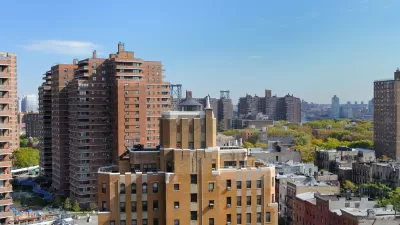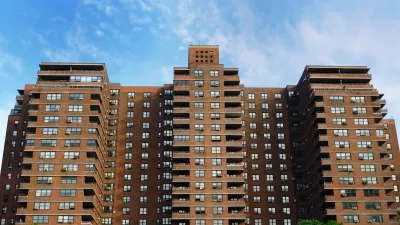Housing authorities in cities like San Antonio are turning to public-private partnerships and mixed-income development, but do these projects exclude the households who need housing assistance most?

“Even with low-cost housing harder than ever to find in most American cities, the stock of public housing is shrinking. The number of families living in public housing shrank 6.5 percent during a recent five-year period, according to the Urban Institute — not a huge decline, but a decline nonetheless,” writes Jared Brey in Governing.
A controversy in San Antonio’s public housing authority reveals broader tensions across the country as affordable housing becomes more inaccessible for the families that need it.
As Brey explains, “Once focused solely on building and maintaining public units for poor people, housing authorities now engage in a wide variety of housing-related activities, sometimes partnering with private developers to build apartments for people who make barely less than the median income.” This often squeezes out the lowest-income tenants, making fewer units available to them and displacing households when former public housing buildings are redeveloped into mixed-income projects.
The former president and CEO of San Antonio’s housing authority, Opportunity Home, was fired recently after putting a stop to a mixed-income redevelopment project and letting $2 million in unpaid rents accumulate during the pandemic, putting the agency at a deficit. The authority now wants to move forward with more mixed-income redevelopment projects, worrying some tenants.
Public housing, for some, is the only viable option. “Housing vouchers don’t provide the same level of stability as traditional public housing. There’s also nowhere nearly enough in terms of either housing vouchers or public housing units to serve everyone who qualifies for one, in San Antonio or anywhere else.”
FULL STORY: Keep Public Housing Public': San Antonio Dispute Reflects National Tensions

Study: Maui’s Plan to Convert Vacation Rentals to Long-Term Housing Could Cause Nearly $1 Billion Economic Loss
The plan would reduce visitor accommodation by 25,% resulting in 1,900 jobs lost.

Alabama: Trump Terminates Settlements for Black Communities Harmed By Raw Sewage
Trump deemed the landmark civil rights agreement “illegal DEI and environmental justice policy.”

Why Should We Subsidize Public Transportation?
Many public transit agencies face financial stress due to rising costs, declining fare revenue, and declining subsidies. Transit advocates must provide a strong business case for increasing public transit funding.

Paris Bike Boom Leads to Steep Drop in Air Pollution
The French city’s air quality has improved dramatically in the past 20 years, coinciding with a growth in cycling.

Why Housing Costs More to Build in California Than in Texas
Hard costs like labor and materials combined with ‘soft’ costs such as permitting make building in the San Francisco Bay Area almost three times as costly as in Texas cities.

San Diego County Sees a Rise in Urban Coyotes
San Diego County experiences a rise in urban coyotes, as sightings become prevalent throughout its urban neighbourhoods and surrounding areas.
Urban Design for Planners 1: Software Tools
This six-course series explores essential urban design concepts using open source software and equips planners with the tools they need to participate fully in the urban design process.
Planning for Universal Design
Learn the tools for implementing Universal Design in planning regulations.
Smith Gee Studio
Alamo Area Metropolitan Planning Organization
City of Santa Clarita
Institute for Housing and Urban Development Studies (IHS)
City of Grandview
Harvard GSD Executive Education
Toledo-Lucas County Plan Commissions
Salt Lake City
NYU Wagner Graduate School of Public Service





























